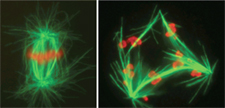Novel artificial proteins boost industry and science
08 Jul 2010
The creation of synthetic proteins plays an important role for economy and science. By the integration of artificial amino acids into proteins (genetic code engineering), their existing qualities can be systematically improved, leading to the creation of new biological features.
 |
| By integrating artificial amino acids into proteins in our body, a process known as genetic code engineering, the qualities of proteins can be systematically improved to create new biological features |
Now, scientists at the Max Planck Institute of Biochemistry (MPIB) at Martinsried near Munich, Germany, have succeeded in taking another important step in this research area: For the first time, they were able to integrate three different synthetic amino acids into one protein in a single experiment. (Angewandte Chemie, June 24, 2010).
Proteins are the main actors in our body: They transport substances, convey messages and carry out vital processes in their role as molecular machines. These "helmsmen of the cell" are composed of amino acids, whose sequence is already defined by the heritable information in every living being. The translation of this information during the production of proteins (protein synthesis) is determined by the genetic code. Twenty amino acids form the standard set from which proteins are built.
However, in nature, several hundred amino acids can be found and, of course, new amino acids can also be produced in the laboratory. With regard to their properties, they differ from the 20 standard amino acids, because of which, by their integration into proteins the specific structural and biological characteristics of proteins can be systematically changed.
So far, only one type of synthetic amino acid could be inserted into a protein during a single experiment, in a residue-specific manner; thus, only one property of a protein could be modified.
Nediljko Budisa, head of the research group on molecular biotechnology at the MPIB, has now made important progress in the area of genetic code engineering. The scientists were able to substitute three different natural amino acids with synthetic ones in a single experiment. Budisa is extremely pleased, "The research area of genetic code engineering and code extension has with this result reached a new development phase."


















